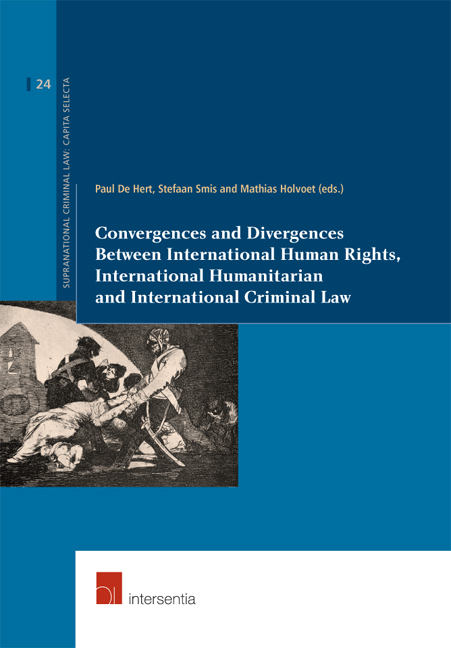Book contents
- Frontmatter
- Foreword
- Preface
- Contents
- About the Contributors
- Part I Convergences and Divergences between International Human Rights Law and International Criminal Law Stricto Sensu
- Part II Convergences and Divergences between International Human Rights Law and Transnational Criminal Law
- Strengthening Action to End Forced Labour: The Ilo Forced Labour Protocol and States’ Positive Human Rights Obligations
- The International Law of Human Trafficking: At the Forefront of the Convergence between Transnational Criminal Law and International Human Rights Law?
- International Security and Financial Stability: Resolving Norm Conflicts between Anti-corruption and Individual Rights
- Part III Convergences and Divergences between International Human Rights Law and International Humanitarian Law
- Conclusion
- Index
- About the Editors
International Security and Financial Stability: Resolving Norm Conflicts between Anti-corruption and Individual Rights
from Part II - Convergences and Divergences between International Human Rights Law and Transnational Criminal Law
Published online by Cambridge University Press: 11 October 2018
- Frontmatter
- Foreword
- Preface
- Contents
- About the Contributors
- Part I Convergences and Divergences between International Human Rights Law and International Criminal Law Stricto Sensu
- Part II Convergences and Divergences between International Human Rights Law and Transnational Criminal Law
- Strengthening Action to End Forced Labour: The Ilo Forced Labour Protocol and States’ Positive Human Rights Obligations
- The International Law of Human Trafficking: At the Forefront of the Convergence between Transnational Criminal Law and International Human Rights Law?
- International Security and Financial Stability: Resolving Norm Conflicts between Anti-corruption and Individual Rights
- Part III Convergences and Divergences between International Human Rights Law and International Humanitarian Law
- Conclusion
- Index
- About the Editors
Summary
INTRODUCTION AND OVERVIEW
Institutional and systemic corruption in one way or another is an undeniable problem in both Western and developing countries. It plays into the hands of internationally organised crime structures and kleptocratic government regimes. The background, impact and consequences of corruption are as intangible as they are devastating, coming with a serious threat to international security and the integrity of financial systems. Addressing the spread of corruption and so-called white-collar crimes on the international plane is therefore a step that can only be applauded. These efforts inevitably draw controversy in the face of tensions with rights of individuals. Engaging in an open debate on these tensions and the need to effectively uphold and respect civil rights goes without saying, and yet one simple and salient point deserves emphasis: the corruption argument must not be seized upon to silence political competition and diversity. Similarly, the human rights argument must not be seized upon to undermine determined action against corrupt behaviour.
In combating corruption, the United Nations Convention against Corruption (UNCAC) obliges States parties to implement a broad legal programme that goes far beyond previous instruments in both scope and detail. It is the first legally binding global anti-corruption agreement. The measures to be introduced range from international cooperation in anti-corruption efforts such as investigation, prosecution, extradition, seizure and return of misappropriated assets, to the promotion of governance principles such as accountability, transparency, and public and corporate integrity.
Given its far-reaching ambition, the UNCAC opens a field of tension between the security of societies on the one hand and the rights of individuals on the other: aspects of the UNCAC are inconsistent with international obligations on human rights. The chapter therefore explains the legal relationship between the UNCAC and international human rights law (IHRL). It highlights that the UNCAC's aim of containing corruption is an essential element of international peace and security. The tensions between this aim and ensuring the enjoyment of civil and political rights are also a reflection of structural and general problems that come along with the phenomenon of fragmentation in international law.
The relationship between the UNCAC and IHRL gives rise to one of the most urgent problems in a fragmented international legal order: the addressing of norm conflicts between disparate law regimes (inter -regime conflicts).
- Type
- Chapter
- Information
- Convergences and Divergences Between International Human Rights, International Humanitarian and International Criminal Law , pp. 133 - 160Publisher: IntersentiaPrint publication year: 2018



